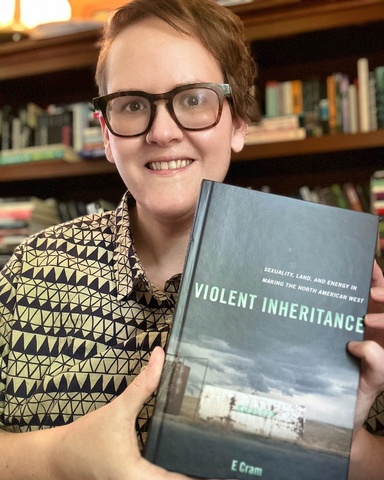By Charlotte Brookins
The Rhetoric Society of America (RSA) has announced E Cram as the winner of its 2023 Book Award for their 2022 work entitled Violent Inheritance: Sexuality, Land, Energy, and the Making of the North American West. This award is presented annually to the best publication by an RSA member published during the current academic year. This year, Cram’s book was chosen as one of two winners out of thirty nominations.

“I was honored to receive this award, which is bestowed by my peers within the Rhetoric Society of America,” says Cram. “Our discipline at the RSA is often on the cutting edge of interdisciplinary humanistic work, and this award is a testament to the ways in which my colleagues have supported my interdisciplinary scholarship throughout my career.”
Cram, who is an associate professor appointed in both communication studies and gender, women's and sexuality studies, is also an associate editor of the Oxford Encyclopedia of Queer Studies and Communication, focuses much of their research on cultural, rhetorical, queer, and environmental studies. Violent Inheritance uses archival work to combine these topics and examine the convergence of racialization, sexualization, and violence in settler colonialism.
“Violent Inheritance examines the history of sexuality as a story about energy in ways that establish connections between the knowledge systems of the 19th century and much larger energy regimes that constituted American myths of land exploration, fossil fuels, and broader ideas of national vitality,” Cram describes. “I draw from over 10 years of archival and ethnographic history, especially regarding contested memory sites. This research matters because it can teach us how to engage with cultures of energy and environment at a critical juncture for the planet.”
Cram is currently producing a podcast for their second project, Disability Ecologies of Care and Memory, which is a book examining the rhetorical life of the Johnson County Historic Poor Farm with regard to disability cultural memory. The book examines connections between historic preservation and restoration, food systems communication, and disability history. They are also collaborating with San Francisco State University professor Constance Gordon on a digital humanities project tracing abundance in the environment entitled The Abundant Ecologies Collaborative.
Cram has had essays featured in a variety of academic publications such as the Quarterly Journal of Speech and Queering the Countryside: New Directions in Rural Queer Studies. They also received the Stephen Lucas Debut Publication Award from the National Communication Association in 2014.